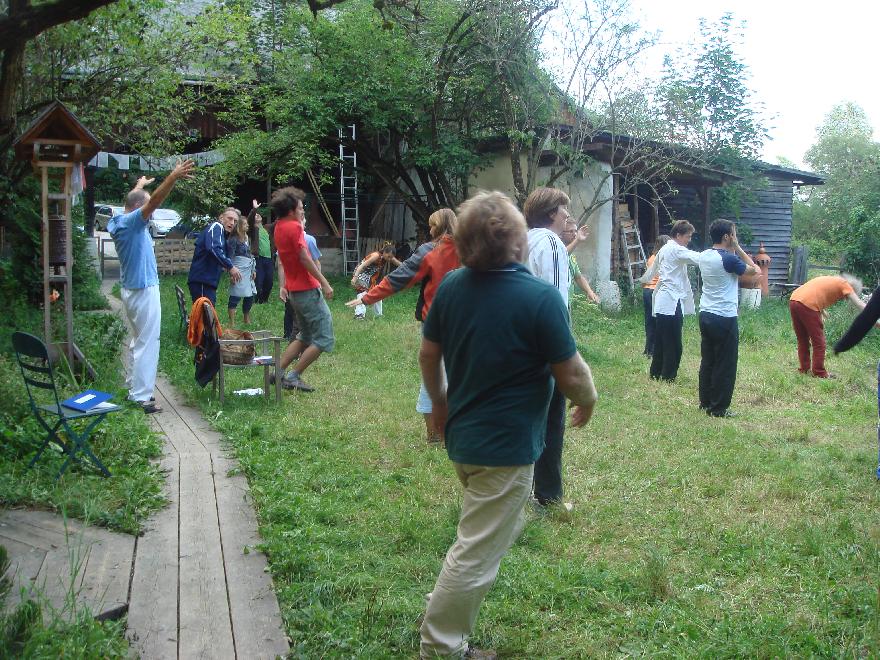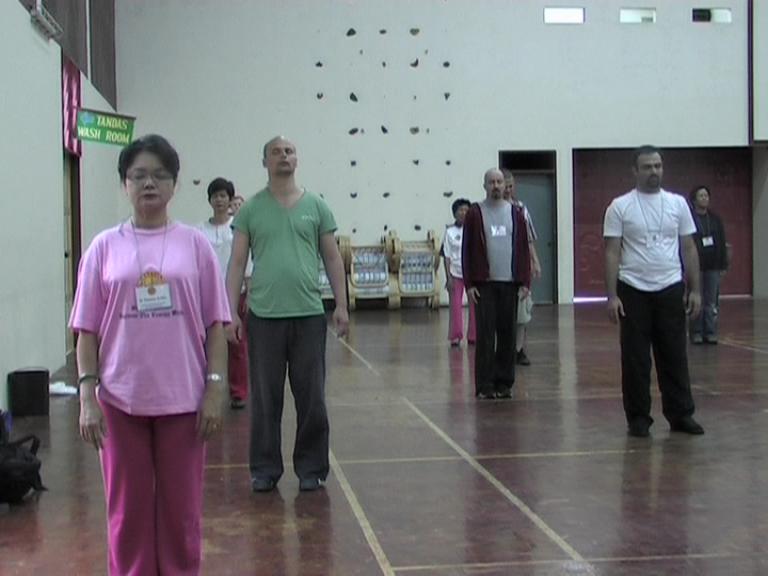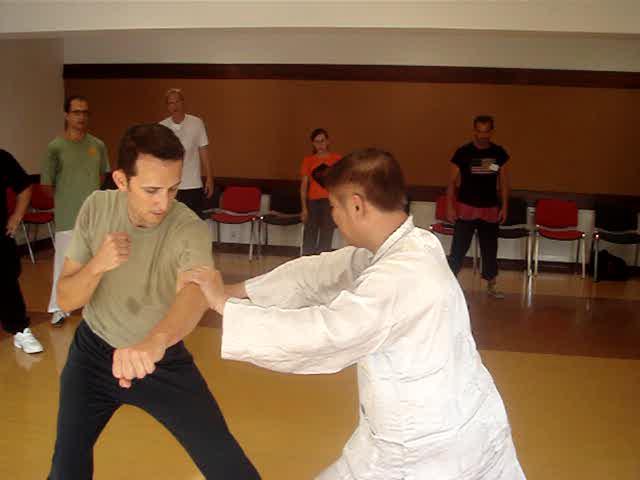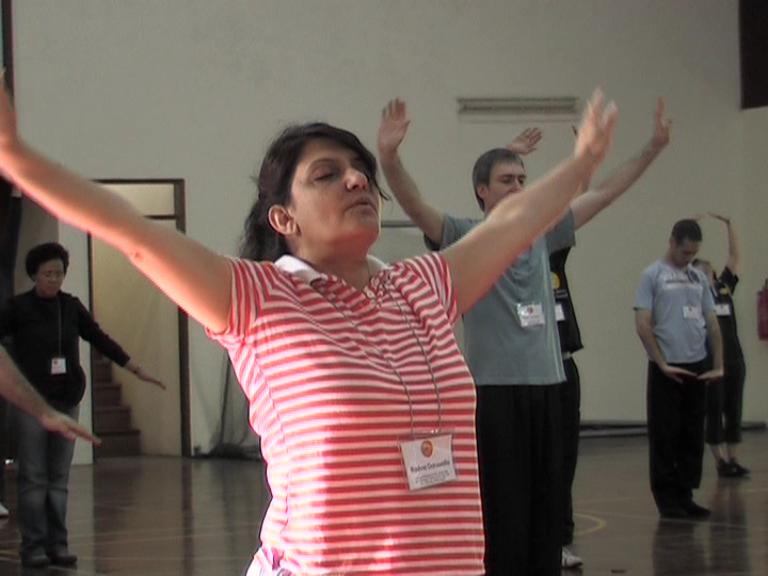SELECTION OF QUESTIONS AND ANSWERS
FEBRUARY 2011 PART 1

Perform the exercise in a relaxed manner and without thinking of anything. Then enjoy a chi flow.
Question 1
I am very thankful for your previous emails to me. Your answers helped me a lot and changed my life for the better. Million thanks for your time spent in the Question-Answer Series. Your information provided is more worth than gold. It is very rewarding that you share so great an art with the world.
— Denas, Lithuania
Answer
Thank you for your kind words.
Many people have kindly written to thank me for my advice.
We in Shaolin Wahnam have benefited tremendously from our philosophy and practice, and are dedicated to pass on the wonderful benefits of our arts to deserving students as well as to disseminate right information.
We are living in a golden age of information. With the internet, we can literally access invaluable information at the touch of our fingers. However, there is also a lot of wrong information on the internet, as well as in some books. It is therefore necessary to differentiate the right from the wrong, the good from the bad.
An excellent way to tell right and good information from the wrong and bad is to see which brings the desired result it is supposed to give. Let us take an example. There are two sources of information, A and B, for practicing chi kung.
Source A states that you should not worry unnecessarily over details of the exercise but should practice the exercise in a relaxed manner without thinking of anything. After some time of daily practice, which may range from a few days to a few months, you would enjoy an energy flow.
Source B states that you should pay careful attention to correctness of form, face a particular direction according to the time of the day, and visualize energy flowing into some selected organs as you perform a particular exercise. After some time of daily practice you should be healthy and strong.
Presuming that you have followed the instructions correctly, if both give the desired results, then both are right and good. If one gives the desired result but the other doesn't, then the former is right and good, whereas the other is wrong and bad. If both do not give the desired results, or worse give adverse effects, then both are wrong and bad.
If you have read my website regularly, you would have noticed that the information from Source A is the type of advice we give, and that from Source B is the type we avoid.
A problem with this way of checking information is that it takes some time. You need to try out the information before you can tell whether it is good or bad.
However, you can overcome this problem by examining others who have tried out the information. You can also confirm your finding by checking whether the givers of the information manifest the result their advice is purported to bring.
For example, if you find a lot of students as well as instructors who advocate the information from Source A can enjoy an energy flow, but students and instructors who use information from Source B are tensed and stressful, you can conclude that Source A information is right and good, whereas Source B information is wrong and bad.
This is sensible and logical, yet there are thousands of people following advice from professionals who overtly show the opposite of what their advice is purported to bring. Thousands of people learn chi kung from instructors who are sick and weak, learn martial arts from teachers who cannot apply their own martial arts for combat, and seek treatment from professionals who themselves comprise the biggest groups of sufferers of the diseases they are supposed to cure!
It is difficult to make such a comment. I honestly do not want to belittle these instructors, teachers and professions, some of whom have dedicated their lives to their practice, but it pains me to see thousands of people suffer, including many of these instructors, teachers and professionals, because they have failed to see this truth.
Question 2
I have read a famous author about mindfulness practice in everyday life and Zen meditation. I want to start practice Zen in everyday life to gain more control over my mind.
Answer
Meditation is an art that demand great skills. Like other arts that demand great skills, such as surgery and deep-sea diving, you should learn it personally from a competent teacher, not from books even though the books may be writtern by experts.
Unfortunately most people who attempt meditation, and even some who teach it, do not appreciate this fact. Worse, they do not even realize that their practice, often dedicated, not only does not bring the results they want but often brings harmful effects. I have met many meditation practitioners, including many meditation teachers, who are dull and depressed. Yet the most basic requirement as well as the most basic benefit of meditation is to be fresh and relaxed.
The instructions for meditation are actually very simple. Basically, a practitioner adopts a suitable poise, such as standing upright or sitting in a lotus position, is totally relaxed and focuses his mind on one or expands his mind to zero. But it needs great skills to do so.

We in Shaolin Wahnam practice meditation, which is a training of mind, every time we practice chi kung. Here course participants at an Intensive Chi Kung Course in Sabah, Malaysia, are enjoying a meditative state of mind.
Question 3
In everyday life to be present it is easier for me to let go of all thoughts than to be aware of all my monkey mind.
Answer
Letting go of all thoughts and being aware of your mind are two cardinal techniques in meditation. The first technique leads to zero, and the second leads to one.
Letting go of all thoughts is also the primary requisite to start practicing meditation. If your mind is full of thoughts, you are merely adopting a meditation poise, like sitting in a lotus position, but you are not practicing meditation.
Indeed, the word "meditation" is badly chosen. It implies using the mind to intellectualize, which is actually what a meditator should avoid. But the word has become established. In classical Chinese, meditation is known as "ru jing", literally meaning "entering silence". In Shaolin context it is "entering Zen", and in Taijiquan context it is "entering Tao". In our chi kung training, it is entering a chi kung state of mind.
Most people have diffiuclty letting go of their thoughts. If you can let go of your thoughts, you have accomplished much, and have the most basic pre-requisite for meditation.
In meditation practice, you need not be aware of your monkey mind. In fact you should do the opposite. You should not be aware of your monkey mind.
Then what will happen, or what has happened, or what is happening to your monkey mind? You need not worry about this. If you do, you start to intellectualzie, which you should avoid. Just be unaware of your mind, irrespective of whether it is monkey or otherwise.
Being aware of their monkey mind is one of many meditation techniques some meditators use. Their purpose is to tame the monkey. But if you find this technique not suitable for you, you need not use it. There are many other techniques, but you should learn one or more from a competent living instructor, not from an e-mail.
Question 4
So, how is letting go connected to mindfulness?
Answer
This is an intellectual question. There may be different answers and all of them may be correct. Philosophers like to indugle themselves in such intellectual questions and answers, and become dull and depressed in the process.
You may know all the correct answers, but that does not make you a better meditator or give you practical benefits, such as having mental clarity and being more efficient in your work, which meditation practice should give.
This does not mean that philosophy is not good. Far from it, philosophy provides us with excellent guidelines which enable us to have good results. But the point is that one should not be so engrossed in philosophy, wittingly or unwittingly, that he loses sight of practical benefits.
With this important point in mind, let us look at your two questions and my answers, and hopefully have some intellectual pleasure. The first answer depends much on what you mean by "mindfulness".
If we take it to mean mental clarity or being aware of the present moment, which is most likely to be in the given context, letting go of thoughts is directly connected to mindfulness. The more efficiently you let go of thoughts, the more clear your mind is, and the more capable you are aware of the present moment. If your mind is full of thoughts, these thoughts will distract you from effective thinking, and cause you to be less aware of your present moment.
If we take "mindfulness" to mean intellectualization or using the mind to think, letting go of thoughts is moving away from mindfulness. The more you let go of thoughts, the less you intellectualize or think.
It is interesting to note that both answers are diagonally opposite, though both are correct. The difference is due to different interpretation of the key word. Mis-understandings among many people often happen because of such different interpretation. Realizing this fact can help us to avoid many mis-understandings.
It is also important to note that letting go of thoughts is moving away from intellectualization or thinking. But this does not mean the inability to intellectualize or think. In fact, the more effectively one can let go of thoughts, the more effectively he can intellectualize or think when he wants to. If there are too many thoughts in his mind, his ability to intellectualize or think will be negatively affected.
As an analogy, when you rest your body, you do not work. But resting does not mean the inability to work. In fact, the more effectively you can let go of your physical tensions and rest, the more effectively you can work when you want to work. If you just work and work and cannot rest, your ability to work will be negatively affected.

Attaining a state of no-thought, or not thinking of anything, is a very important aspect of our kungfu training. At a regional Shaolin Kungfu course in Portugal, without thinking Grandmaster Wong deflects a punch from Hugo, and immediately encounters with a strike at Hugo's ribs.
Question 5
Is it correct to say that letting go is the part of this higher consciousness?
Answer
This is another intellectual question. Bearing in mind that we can have different correct answers to this question depending on our interpretation of the key term "higher consciousness", and that the philosophical answers, though interesting by themselves, should lead us to better practical benefits and not enslave us to mere intellectualization. Here is my answer.
I take "higher consciousness" to mean awareness of reality not normally experienced by ordinary people. Yes, letting go of thoughts leads to this higer consciousness.
There are different levels of higher consciousness. For convenience we may classify them into three broad categories: the basic, the intermediate and the advanced.
Many people are not aware of their present moment because of many thoughts in their mind. For example, if you are thinking of other things, you may not understand the sentence you are now reading. If you ask a question, and thinking of other questions to ask, you may not be aware of the answer given. If you clear your mind of all thoughts, you will better understand what you read, and better understand the answer to your question. This is higher consciousness at its basic level.
At the intermediate level, higher consciousness enables you to be aware of happenings that are not overtly expressed. For example, when you are in a company of people, you may be awared of who are friendly and who are hostile even before they open their mouths. Many of our students reported that in their free sparring, they often knew their opponents' moves before their opponents made them.
At the advanced level you may be awared of Cosmic Reality that some uninformed persons may consider crazy. You may, for example, see heavenly scenes, find yourself beyond your physical body, or be in the presence of God or whatever term you call the Supreme. Such experiences are called satori. Many of our students have such beautiful experiences during my courses.
Question 6
In everyday life I do this: Be totally relaxed, smile from the heart and let go with awareness.
Answer
This is excellent. Such practical action is better than all the intellectual knowledge you can get from my answers.
If you do this correctly, you will experience peace and inner joy.
Editorial Note: Denas' other questions can be found here, and here.

"Lifting the Sky" is a wondrous exercise in our school. It is relatively easy to perform but brings a lot of benefits. Here course participants at an Intensive Chi Kung Course in Sabah, Malaysia enjoying "Lifting the Sky".
Question 7
I suffer from chronic migraines for over 15 years. I am somewhat desperate. I do not remember all this time having spent one month without suffering from it. Can you give me some advice on Shaolin chi that I can do well for this problem?
— Joaquin, Brazil
Answer
You may be pleased to know that I myself suffered from migraines in my young days. It was so bad that I had to carry medical pills with me everyday.
But the migraines went away after I practiced chi kung regularly. Actually I did not know when exactly the migraines went away. I just realize I was no longer carrying medical pills everyday.
Practicing high-level chi kung is an excellent way to overcome migraines. But you need to learn it personally from a good teacher. You should make sure that what you learn is genuine chi kung, and not just some gentle physical exercise.
The forms are the same in chi kung and gentle physical exercise. In fact many chi kung practitioners nowadays do not know the difference. The crucial difference is that in chi kung there is chi flow, but not in gentle physical exercise.
Question 8
I have read some of Sifu Wong's books and I would like to ask what exercises are best for preventing migraines? Many of my migraines are caused by weather changes, like storms and wind. What I can do in these cases?
Answer
It is not the type of chi kung exercise you practice, but how you practice it that is importnat. Indeed, this is an important fact that many people who practice chi kung do not realize.
Why is the skill in practicing chi kung more important than the chosen exercise?
Let us take an example. "Lifting the Sky" is excellent for overcoming migraine. But many people who suffer from migraine may practice "Lifting the Sky" diligently, but still they cannot overcome their problem. Why? As mentioned above, it is not the exercise but how it is practiced that is important.
An analogy will make this clear. Suppose you are in a car race. Which car would enable you to win a prize?
At the basic level, if you do not know how to drive, it doesn't matter which car you use you would not win a prize. On the other hand, if you are a very skilful driver, it doesn't matter which car you drive, you would win a price.
Now we move on to the next level. All the competitiors are equally skilful dirvers. In this situation, those with powerful cars will win prizes, whereas those whose cars are mediocre will be left behind.
Now we have a different situation. The one with a mediocre car is a far superior driver than another dirver with a powerful car. The former may win a prize whereas the latter may not.
The same principles apply when we substitute driving a car to win a prize with practicing chi kung to overcome illness. At the basic level, if you do not know how to practice chi kung, it does not matter what chi kung exercise you choose to perform, you would not overcome your illness. At a higher level, amongst those who have the skills to practice chi kung, the ones using more appropriate exercises will be more effective in overcoming their illness than others who use less approprate methods. In another situation, when a practitioner is very skilful, he can be more effective than a less skilfull practitioner in overcoming illness even when the former uses an exercise that is not as powerful.
This is the same as teaching chi kung, or teaching driving. If you do not know how to teach, it does not matter what chi kung exercise you teach or what car you use, your student would not overcome his illness or win a prize. If teachers have similar teaching skills, those who choose powerful methods or cars will produce better results. On the other hand, a skilful teacher will produce better result than a mediocre one even when the former uses a less powerful method or car.
This explains why you can't learn chi kung from books, in the same way a non-driver cannot learn driving from a driving manual. It is because you are not a chi kung teacher, and the non-driver is not a driving instructor.
Logically, one would get the best results -- in chi kung, driving or any art -- if he has the combination of an excellent teacher, excellent methods and he himself is an excellent student.
I would recommend that you learn from one of our certified instructors, or attend my Intensive Chi Kung Course. Basing on the results, we are not afraid to say that we have excellent teachers, excellent methods and we produce excellent students.
After you have learnt from us, you should have excellent skills to practice chi kung, and be able not only to overcome migraine, irrespective of whether they are caused by storms and winds or other factors, but also to have good health, vitality and longevity. Overcoming illness is just a stepping stone to many more wonderful benefits.
LINKS
Selected Reading
- Wahnam Taijiquan against Other Martial Ats - Abridged Version
- Techniques, Tactics and Skills
- Examples of Intellectual Questions
- Shaolin Five-Animal Set
- We Experienced a Kind of Miracle when we Came Back
